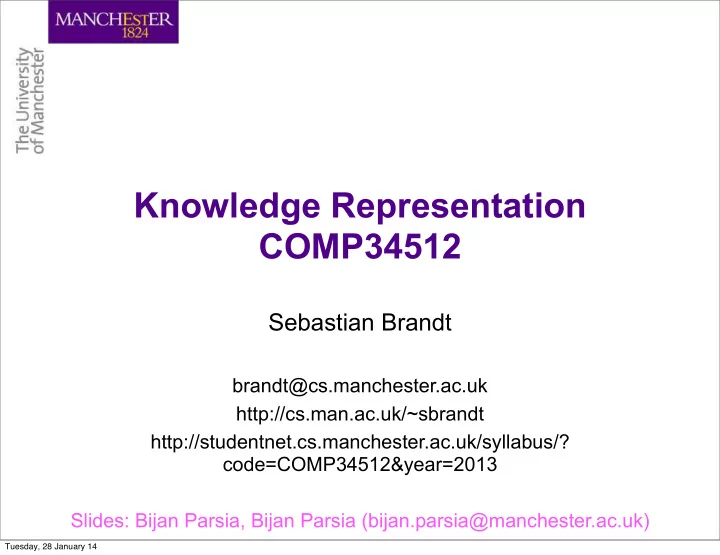

Knowledge Representation COMP34512 Sebastian Brandt brandt@cs.manchester.ac.uk http://cs.man.ac.uk/~sbrandt http://studentnet.cs.manchester.ac.uk/syllabus/? code=COMP34512&year=2013 Slides: Bijan Parsia, Bijan Parsia (bijan.parsia@manchester.ac.uk) Tuesday, 28 January 14
Knowledge Representation • “Knowledge” – Comes in different forms • Knowing that vs. knowing how (or “know-how) • “Propositional” vs. “procedural” – Classic philosophical definition: Justified True Belief • Generally we use a looser sense, – e.g., “believed to be true” or “asserted” • Representation – Anything with “aboutness” • I.e., a re-presentation has a relation to some other “thing” • The representation proxies for the thing • Common case: a symbol (or symbolic structure) • Knowledge + Representation? – (“KR” or sometimes “KRep) – Isn’t all representation representation “of knowledge”? 2 Tuesday, 28 January 14
Computational KR • We’re concerned with – representing propositional knowledge – symbolically (mostly) – in a way amenable to programatic manipulation • in particular, amenable to automated reasoning • This introduces constraints – Know that + symbols suggests KR formalisms • I.e., languages designed to support building KRs – Manipulability suggests • precise semantics • computationally reasonable processes • Our starting paradigm – Written human communication • And supporting mechanisms – I.e., Modelling 3 Tuesday, 28 January 14
Applications • NLP – As support or target • Data integration • Expert systems – Classically diagnosis • Intelligent tutoring systems • Games • Cognitive science/Psychology • Planning and decision support • Personal assistants • Data acquisition • Clinical support systems • Etc. 4 Tuesday, 28 January 14
COMP34512 • We’ll explore – the conceptual foundations – various formalisms • with a focus on design considerations – modelling techniques – reasoning – applications • and benefits of using KR • Core formalism family – Decidable fragments of FOL – Specifically “description logics” • Other topics – Psychology modelling – The Semantic Web & Linked Data 5 Tuesday, 28 January 14
Anatomy of the Course • Bi-weekly lectures (mostly) – Tuesday at 12:00 (but you, here, know this!) – Thursday at 12:00 • Associated/recommended reading will be given – Not all of the relevant information will be contained in lecture materials and notes – Sometimes there is anticipatory reading • Ask questions and promote discussions in lectures – I’m quite happy to have (fruitful) digressions – When in doubt, speak • There will be guest lectures 6 Tuesday, 28 January 14
Assessment • Exam and coursework • Exam: 80% – Online – Consists of a combination of objective and freetext questions • Coursework/Labs: 20% – Short essays – Modelling exercises – VLE for distribution and return • I try to avoid conflicts with other deadlines – esp. project deadlines – Let me know if things crop up • before my deadlines! • In general, deadlines are strict – Mitigating circumstances @ SSO is the way to go 7 Tuesday, 28 January 14
Resources • Course web page – http://studentnet.cs.manchester.ac.uk/syllabus/ ?code=COMP34512&year=2013 • University’s Blackboard system – Discussion and collection of relevant materials – Discussion Forum • I monitor closely • Twitter for course updates and comments – Hash tags: #uon #comp34512 – Users: @bparsia 8 Tuesday, 28 January 14
A simple analogical example Tuesday, 28 January 14
A Problem • Something we know – What a Google Search Results page is – How to recognise it • How to capture this knowing? • First, what’s the content – (Simplified example!) – Google's pages contain “Google” – Search result pages expand the number of “o”s in “Google” • Second, how to express it – And what do we get for different sorts of expression? 10 Tuesday, 28 January 14
In Natural Language • We already did that! – “Google's pages contain “Google” and Search result pages expand the number of “o”s in “Google”” • But that’s not very precise or clear – We can refine it • A page that has the extended spelling of “Google” • A page that contains “Gooogle” • A page that contains a substring “Gooo” • A page that has a substring “Goo” – followed by one or more “o”s, – then by “gle” • Way more precise but – not directly actionable – we have a spec, not a recogniser • Precise specs are good things, of course 11 Tuesday, 28 January 14
As Computer Code • Executable (mostly) • Precise • But..... – Not very clear – Lots of irrelevant details – Portability issues 12 Tuesday, 28 January 14
A Formalism • We could design a language for strings – Basic characters: a-zA-Z – * for zero or more • This allows us to represent a class of strings, i.e.: – Goooo*gle • To exploit the representation, we use “search” – search("Goooo*gle", "Gogle") ⇒ false – search("Goooo*gle", "Google") ⇒ false – search("Goooo*gle", "Gooogle") ⇒ true – search("Goooo*gle", "Goooooogle") ⇒ true • We don’t have to care how “search” is implemented 13 Tuesday, 28 January 14
Extending the Formalism • We could add expressivity – More characters: 0-9! – | for alternation • We might design other services – equiv("(Yah|G)oooo*(gle|!)","Yahoooo*!|Goooo*gle") – contained_in("Yahooo*!","(Yah|G)oooo*(gle|!)") • We can evaluate our formalism – Can we say what we want to say? – Can we do useful things with what we say? – Is it easy to say what we want to say • or understand what we’ve already said? 14 Tuesday, 28 January 14
Next Class • We'll start on the knowledge acquisition problem – How to conceptualise a domain • I.e., the refinement step • In class lab – Please attend and on time! 15 Tuesday, 28 January 14
Recommend
More recommend